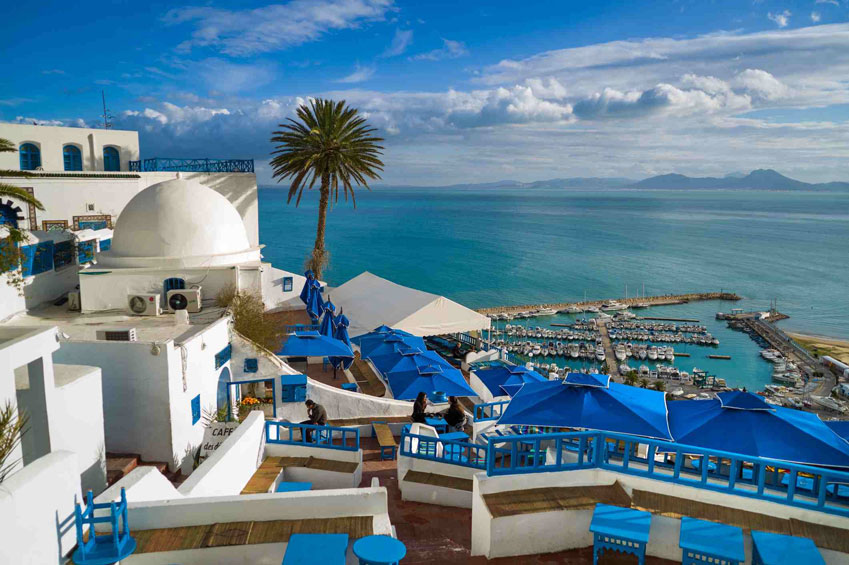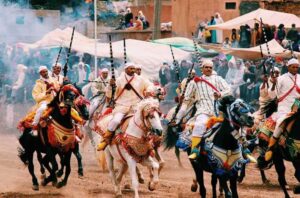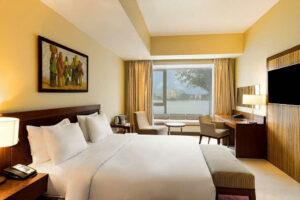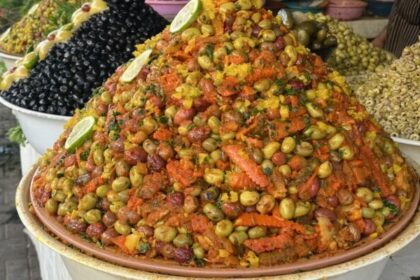Table of Contents
Introduction
Step into the vibrant and beautiful landscape of North Africa’s finest destinations, where ancient wonders meet modern charm. From the iconic pyramids of Cairo to the coastal allure of Alexandria, and the bustling streets of Marrakech to the rich heritage of Tunis and Algiers, there’s a world of adventure waiting for you to discover. Take a look at these exciting destinations.
1. Cairo, Egypt
2. Alexandria, Egypt
3. Marrakesh, Morocco
4. Tunis, Tunisia
5. Algiers, Algeria
Pro Tips
Recap
1. Cairo, Egypt
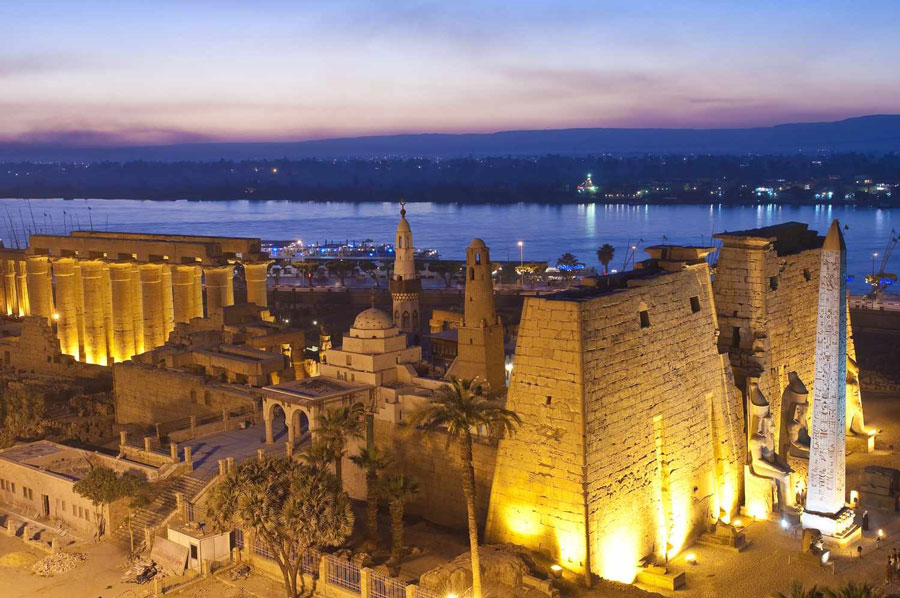
Choose Cairo for an immersive journey through time. Explore iconic landmarks like the Pyramids of Giza and Sphinx. Delve into rich culture with museums showcasing ancient artifacts. Indulge in delectable Egyptian cuisine at affordable prices.
Navigate the city conveniently via the Cairo Metro and readily available taxis. Experience safety for tourists in major areas. With options ranging from budget hostels to luxurious hotels, Cairo offers accommodations for all preferences. Embrace cultural etiquette for a respectful and enjoyable visit.
- Boasts incomparable historical significance with iconic landmarks like the Pyramids of Giza and the Sphinx, offering you a glimpse into the ancient wonders of Egypt.
- Enriches your mind with world-class museums like the Egyptian Museum showcasing an extensive collection of ancient artifacts, enriching the understanding of Egypt’s storied past.
- Tempts your palate with its delicious Egyptian cuisine, tantalizing taste buds with fresh and flavorful dishes that reflect the vibrant culinary heritage of the region.
- Offers an affordable cost of living, allowing you to enjoy comfortable accommodations and dining options without breaking the bank.
- Has high levels of traffic and pollution, which can significantly impact your overall experience.
- Tends to get overcrowded, especially at popular tourist sites, leading to potential discomfort and inconvenience.
- Has extreme heat during the summer months, which makes outdoor activities challenging and uncomfortable.
Travel Tips
- Best Time to Visit: Between October and April to avoid the extreme heat.
- Dress Code: Modest attire due to the religious culture.
- Health: Stick to bottled water and be cautious with street food to avoid illness.
Safety
- General Safety: Cairo is relatively safe for you, especially within the big cities.
- Areas to Avoid: Some regions have security concerns.
Transportation
- Cairo Metro: The oldest metro system in Africa, helps you to navigate the city.
- Taxis and Rideshares: Readily available for convenient travel within the city.
Accommodation
- Options: Range from budget hostels to luxurious 5-star hotels.
- Booking: It’s advisable to book in advance, especially during the tourist season.
Cultural Etiquette
- Respectful Behavior: Removing shoes before entering mosques and other sacred places.
- Tipping: Small bills are useful for tipping, which is a common practice.
2. Alexandria, Egypt
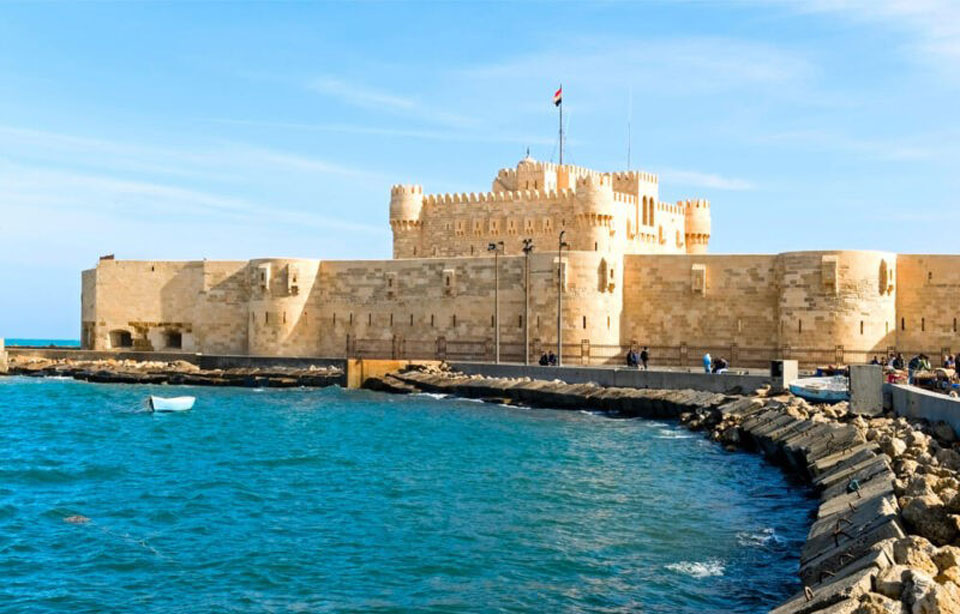
Select Alexandria for its rich cultural heritage, vibrant nightlife, and stunning Mediterranean coastline. Experience a cosmopolitan atmosphere with historical landmarks like the Citadel of Qaitbay and Bibliotheca Alexandrina.
Enjoy moderate year-round weather and easy access to Cairo. Despite challenges like air pollution and crowded streets, Alexandria offers a unique blend of modern living and ancient history. It is an enticing destination if you seek an enriching cultural experience amidst breathtaking surroundings.
- Offers a rich cultural heritage and vibrant nightlife scene, perfect for you if you desire diverse entertainment options.
- Boasts a stunning Mediterranean coastline, providing you with picturesque views and recreational opportunities.
- Provides convenient access to Cairo, facilitating easy travel and enabling you to enjoy the amenities of the capital city.
- Cultivates a diverse and cosmopolitan atmosphere with historical landmarks like the Citadel of Qaitbay, Bibliotheca Alexandrina, and Pompey’s Pillar.
- Suffers from high levels of air pollution, posing potential health risks.
- Becomes excessively rowdy during the summer months due to tourism, resulting in discomfort and difficulty navigating the city’s attractions.
- Presents unreliable public transportation services, leading to inconvenience and delays.
- Demands a higher cost of living when you compare it with other Egyptian cities, potentially straining your finances.
Weather
Moderate weather year-round with a bit of humidity in the summer. Winter is cold, so it’s advisable to have heavy clothing.
Transportation
Transportation is readily available, but traffic jams are common, particularly in the summer months.
Cultural Experience
Alexandria offers a blend of Middle Eastern atmosphere with a Mediterranean setting and cultural and historical background. It is a beacon of Christianity and houses one of the largest Cathedrals.
Leisure and Attractions
The city’s coastline, El Corniche, is a 19km stretch featuring beaches, hotels, and historical sites like El Montazah Palace and Qaitbay Castle.
3. Marrakesh, Morocco
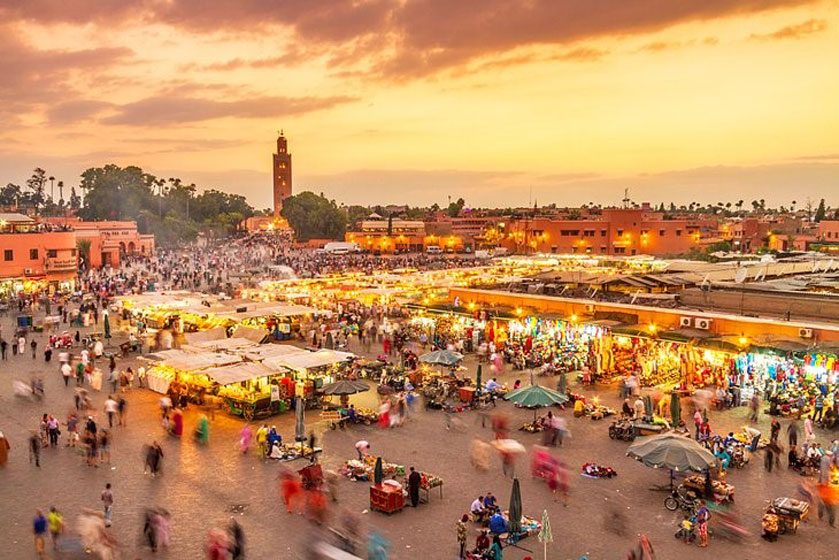
Consider Marrakesh for its vibrant blend of tradition and modernity. Explore a UNESCO World Heritage medina brimming with history. It showcases a thriving design scene where artisans and contemporary designers intertwine.
Enjoy a lower cost of living and diverse cultural experiences. Engage in community initiatives and relish outdoor adventures near the Atlas Mountains. Embrace the warm climate and immerse yourself in the rich Moroccan culture. Marrakesh promises an enchanting and fulfilling lifestyle if you seek adventure and cultural immersion.
- Has pleasant weather for most of the year.
- Provides a lower cost of living different from many Western countries, offering affordable dining and housing options.
- Boasts a rich cultural heritage, featuring historical sites, bustling souks, and an array of cultural festivals to immerse oneself in.
- Encourages community involvement, providing ample opportunities for volunteering and contributing to local causes, fostering a sense of belonging.
- Offers you diverse outdoor activities ranging from mountain hiking to beach outings.
- Presents a significant language barrier, with limited English proficiency outside of tourist hubs, potentially hindering daily communication and interactions.
- Requires a considerable adjustment period, where the initial excitement of cultural differences may eventually lead to frustration and challenges in adapting to local norms and practices.
Location
Central Morocco, within the fertile Haouz Plain, south of the Tensift River.
History
Marrakech’s Medina is a UNESCO World Heritage site, as it’s the first of Morocco’s four imperial cities.
Culture
Popular for its design scene, blending traditional artisans and contemporary designers, offering a rich array of crafts and arts.
Travel Tips
Plan in advance; attractions like Jardin Majorelle require online bookings. Hone negotiation skills for markets and taxis. Consider booking an airport transfer for convenience.
4. Tunis, Tunisia
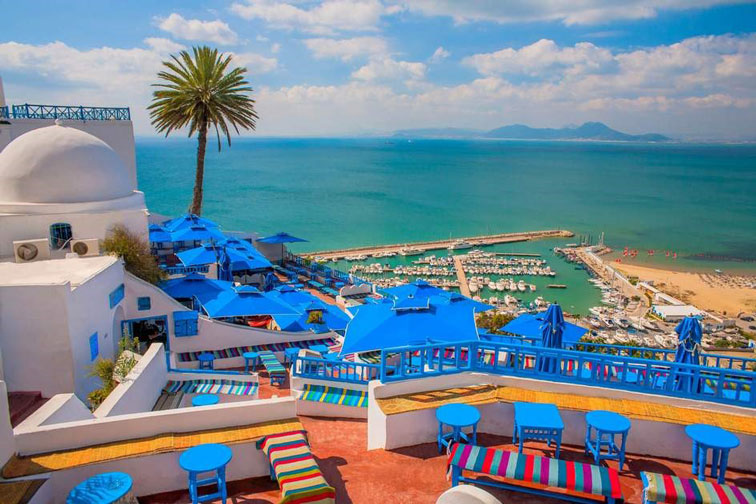
Check out Tunis for its rich cultural cityscape, boasting a blend of Carthaginian, Roman, Arab, and French influences. Explore historical treasures like the Medina and nearby Carthage ruins. Enjoy an affordable cost of living with access to fresh produce.
Enjoy the Mediterranean climate and picturesque beaches. Despite economic challenges and varying infrastructure, the city offers a unique experience worth exploring. Connect with expatriates for unique insights into life in this vibrant metropolis.
- Offers a cultural richness
- Boasts historical sites
- Provides a cost-of-living advantage
- Showcases stunning scenery
- Presents economic challenges, with disparities and pockets of poverty
- Lacks modern infrastructure and amenities in some areas
- Offers varying access to healthcare, with urban areas generally having better facilities
Cultural Richness
- Tunis boasts a rich tapestry of civilizations, reflecting its Carthaginian, Roman, Arab, and French heritage.
- This diverse cultural blend manifests in various aspects of daily life, including cuisine, architecture, and traditions.
Historical Sites
- It is home to Medina, a UNESCO World Heritage Site, famous for its labyrinthine streets, bustling markets, and centuries-old mosques.
- Additionally, Tunis is in proximity to ancient ruins such as Carthage, offering residents ample opportunities for historical exploration and appreciation.
Cost of Living
- The overall cost of living in Tunis is generally affordable.
- You can access fresh local produce and goods at reasonable prices, contributing to a more economical lifestyle.
Scenery
- Tunis benefits from its coastal location, boasting beautiful beaches along the Mediterranean Sea.
- Its historical architecture offers mosques with intricate designs, palaces, and fortifications that add to its scenic charm, offering you beautiful views and opportunities for strolls.
GET SMARTER >>> Africa Tourism – Best Photography Trips in Africa
5. Algiers, Algeria
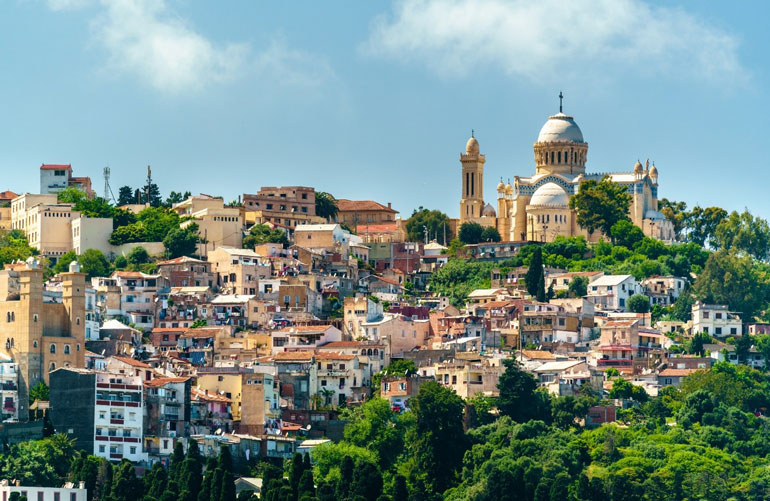
Visit Algiers for its rich and grandiose culture, vibrant Mediterranean coastline, and affordable cost of living. Delight in diverse cuisine and engross yourself in history dating back to Phoenician and Roman times.
Embrace a city brimming with opportunity in sectors like petroleum, natural gas, and tourism. Despite challenges like safety concerns and infrastructure, Algiers offers an enticing blend of tradition and modernity, making it an intriguing choice if you hunger for adventure and cultural exploration.
- Showcases architectural marvels
- Offers gastronomic delights
- Radiates warm hospitality from locals
- Holds historical significance
- Offers cultural diversity
- Boasts scenic beauty
- May pose security concerns and safety risks to travelers
- Has predominantly French-speaking locals which makes communication difficult
- Has heavy traffic congestion, especially during peak hours
- Lacks sufficient tourist infrastructure, impacting accommodations, transportation, and organized tours.
Historical Significance
Algiers boasts a captivating history through civilizations from Phoenicians, Romans, Ottomans, and French colonialists. Landmarks like the Casbah, a UNESCO World Heritage Site, showcase its rich past as a bustling trading hub.
Architecture
Its architecture reflects its diverse cultural heritage, featuring Moorish, Ottoman, and French colonial buildings alongside modern structures. Iconic landmarks include the Grande Poste, Notre-Dame d’Afrique Basilica, and the Martyrs’ Memorial, showcasing Algiers’ architectural splendor.
Cultural Diversity
Algiers is a melting pot of Arab, Berber, and French cultures, offering vibrant neighborhoods, museums, and cultural events.
You can explore the National Museum of Fine Arts and attend festivals to immerse yourself in its rich lifestyle.
Natural Beauty
With its location along the Mediterranean coastline, Algiers offers stunning views of the sea and nearby islands.
Sandy beaches like Sidi Fredj Beach, rugged coastlines, and the nearby Atlas Mountains provide opportunities for relaxation and outdoor activities.
Gastronomic Delights
Algerian cuisine presents a tantalizing array of flavors owing to Mediterranean, Arabic, and Berber traditions. You can savor savory couscous, aromatic tagines, fresh seafood, and delightful pastries like baklava.
Hospitality and Warmth
Algerians are popular for hospitality, offering genuine friendliness and warmth towards visitors. You can expect a welcoming atmosphere, enhancing your overall experience of exploring the city.
Shopping and Markets
Algiers boasts bustling markets where you can browse for souvenirs, traditional crafts, spices, and textiles.
The Kasbah market and El Harrach market are popular destinations for shopping and experiencing local culture.
Cultural Institutions
It hosts a variety of cultural institutions, including theaters, art galleries, and libraries, showcasing Algerian history, literature, and arts.
Notable venues include the Museum of Modern Art and the Museum of Antiquities, offering enriching experiences for cultural exploration.
Pro Tips
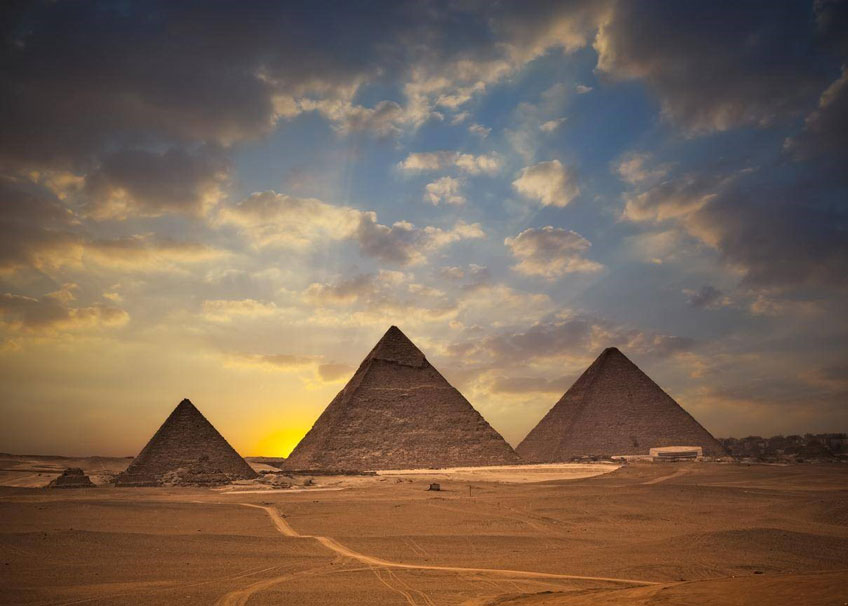
- Plan Ahead: Research your choice destination thoroughly and plan your trip well in advance to ensure a smooth and enjoyable experience.
- Consider Timing: Optimal times to visit North African destinations are usually between October and April to avoid extreme heat and overcrowding during peak tourist seasons.
- Respect Local Customs: Familiarize yourself with the cultural norms and customs of the region you’re visiting. Dress modestly, especially in religious sites, and be mindful of local traditions and etiquette.
- Stay Current About Safety: Exercise caution, especially in crowded places, and keep your belongings secure at all times.
- Book Accommodation in Advance: Secure your accommodation early, especially during peak tourist seasons, to ensure you have a place to stay that suits your preferences and budget.
- Stay Hydrated and Sun-Protected: North Africa can experience high temperatures, so it’s essential to stay hydrated and protect yourself from the sun. Wear sunscreen, a hat, and lightweight, breathable clothing.
- Engage with Local Culture: Immerse yourself in the local culture. Try out traditional cuisine, explore historical sites, and interact with locals. Engaging with the community can enrich your travel experience and create lasting memories.
- Respect the Environment: Be mindful of your environmental impact and strive to leave destinations as you find them. Dispose of waste responsibly and support eco-friendly practices whenever possible.
Recap
Cairo offers historical wonders and affordable living. Alexandria charms with cultural richness and a stunning coastline. Marrakesh blends tradition with modernity, promising outdoor adventures.
Tunis boasts diverse beauties with influences and affordability. Algiers captivates with its historical significance, architectural marvels, and warm hospitality. Each city invites exploration despite potential challenges, ensuring an unforgettable experience.





